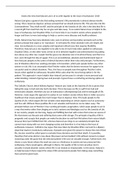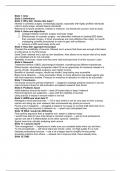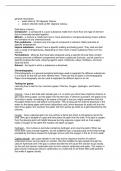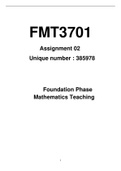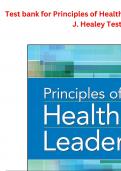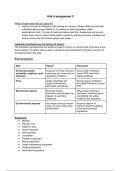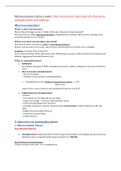Assess the view that Natural Law is of no with regards to the issue of euthanasia’ 2018
Natural Law gives a general rule that ending someone’s life prematurely is almost always morally
wrong. This is based on Aquinas’ primary precept that we should preserve life. This also ties into the
Commandment ‘Thou shall not kill’ and the principle of the Sanctity of Life, this is the idea that life is
a sacred gift from God that only he can give and take away. To an extent Natural Law is helpful to the
issue of euthanasia, but Situation Ethics is of more help in our modern society where people live
longer and there is more technology to help us survive more diseases and health problems
Firstly, Natural Law has many absolute rules, seen in primary and secondary precepts such as the
primary precept that urges us to ‘reproduce’. In everyday life, these absolute rules are simple and
clear, but euthanasia is a very complex and important ethical issue that requires flexibility.
Therefore, Natural Law is too legalistic to be able to be of much help when applied to euthanasia.
Situation Ethics, on the other hand, strives to sit in between legalism and antinomianism by putting
love above any other law. Joseph Fletcher gives one absolute rule in his ethical theory and that is to
love, seen through the idea of agape. This is an unconditional, absolute and disinterested type of
love that puts people at the centre of ethical decisions rather than rules and precepts. Furthermore,
one of Situation ethics four working principles is Personalism, which puts people before any other
system or rule, this is an assumption that Fletcher makes that he deems necessary for agape to be
successful used in ethical situations. Thus, this focus on people seen throughout Fletcher’s ethic
means when applied to euthanasia, Situation Ethics asks what the most loving option is for the
patient. This approach is more helpful than Natural Law because it is simply is more personal and
understanding, instead of giving laws and precepts it gives those a comforting and loving option on
euthanasia.
The Catholic Church, which follows Aquinas’ Natural Law, looks at the Sanctity of Life to prove that
taking life away is God and only God’s decision. This is because our life is a gift from God and
intrinsically valuable, therefore any act of euthanasia is disrespecting God and his loving gift of life.
However, many argue this approach is useless in our modern society where there is wider access to
healthcare that means people live much longer than in Aquinas’ time. This leads people to the
Quality of Life, which argues life has variable value depending on certain aspects such as autonomy
and free will. Without these qualities life is not valuable and therefore can be taken away. This
principle follows one of Fletcher’s four working principles, pragmatism, which urges people to act in
a way that works rather than clinging on to strict systems and ideologies such as the Sanctity of Life.
In our society, people can live long, happy and fulfilling lives but with comes that comes an excess of
life that draws out the pain and suffering that comes with old age. The principle of quality of life is
pragmatic and accepts that people can make the decision to end their life before their natural death
because they have fulfilled their life, whereas Natural Law clings to an outdated principle that
cannot move along with our ever-changing society and therefore is of no help to the issue of
euthanasia. However, Catholics may argue that view taken by Situation Ethics can lead to a slippery
slope that leads to involuntary euthanasia. If people were given the power to choose the end of their
life, doctors would be called upon to evaluate these decisions and aid their death. It is possible,
therefore that some doctors may abuse this power and end patient’s life without consent or proper
reasoning under the guise that the selected patient’s life was not valuable enough. Furthermore, this
shows a scary future where the weak are seen as a hindrance to society and are pressured into
euthanasia. Many would agree, although in theory, the quality of life is more practical, but in
actuality it would disorder society where life is not treated as irreplaceable. In this sense, Natural is
so help because it does respect the value of life and prevents people from taking away something
that cannot be given back.
Natural Law gives a general rule that ending someone’s life prematurely is almost always morally
wrong. This is based on Aquinas’ primary precept that we should preserve life. This also ties into the
Commandment ‘Thou shall not kill’ and the principle of the Sanctity of Life, this is the idea that life is
a sacred gift from God that only he can give and take away. To an extent Natural Law is helpful to the
issue of euthanasia, but Situation Ethics is of more help in our modern society where people live
longer and there is more technology to help us survive more diseases and health problems
Firstly, Natural Law has many absolute rules, seen in primary and secondary precepts such as the
primary precept that urges us to ‘reproduce’. In everyday life, these absolute rules are simple and
clear, but euthanasia is a very complex and important ethical issue that requires flexibility.
Therefore, Natural Law is too legalistic to be able to be of much help when applied to euthanasia.
Situation Ethics, on the other hand, strives to sit in between legalism and antinomianism by putting
love above any other law. Joseph Fletcher gives one absolute rule in his ethical theory and that is to
love, seen through the idea of agape. This is an unconditional, absolute and disinterested type of
love that puts people at the centre of ethical decisions rather than rules and precepts. Furthermore,
one of Situation ethics four working principles is Personalism, which puts people before any other
system or rule, this is an assumption that Fletcher makes that he deems necessary for agape to be
successful used in ethical situations. Thus, this focus on people seen throughout Fletcher’s ethic
means when applied to euthanasia, Situation Ethics asks what the most loving option is for the
patient. This approach is more helpful than Natural Law because it is simply is more personal and
understanding, instead of giving laws and precepts it gives those a comforting and loving option on
euthanasia.
The Catholic Church, which follows Aquinas’ Natural Law, looks at the Sanctity of Life to prove that
taking life away is God and only God’s decision. This is because our life is a gift from God and
intrinsically valuable, therefore any act of euthanasia is disrespecting God and his loving gift of life.
However, many argue this approach is useless in our modern society where there is wider access to
healthcare that means people live much longer than in Aquinas’ time. This leads people to the
Quality of Life, which argues life has variable value depending on certain aspects such as autonomy
and free will. Without these qualities life is not valuable and therefore can be taken away. This
principle follows one of Fletcher’s four working principles, pragmatism, which urges people to act in
a way that works rather than clinging on to strict systems and ideologies such as the Sanctity of Life.
In our society, people can live long, happy and fulfilling lives but with comes that comes an excess of
life that draws out the pain and suffering that comes with old age. The principle of quality of life is
pragmatic and accepts that people can make the decision to end their life before their natural death
because they have fulfilled their life, whereas Natural Law clings to an outdated principle that
cannot move along with our ever-changing society and therefore is of no help to the issue of
euthanasia. However, Catholics may argue that view taken by Situation Ethics can lead to a slippery
slope that leads to involuntary euthanasia. If people were given the power to choose the end of their
life, doctors would be called upon to evaluate these decisions and aid their death. It is possible,
therefore that some doctors may abuse this power and end patient’s life without consent or proper
reasoning under the guise that the selected patient’s life was not valuable enough. Furthermore, this
shows a scary future where the weak are seen as a hindrance to society and are pressured into
euthanasia. Many would agree, although in theory, the quality of life is more practical, but in
actuality it would disorder society where life is not treated as irreplaceable. In this sense, Natural is
so help because it does respect the value of life and prevents people from taking away something
that cannot be given back.

